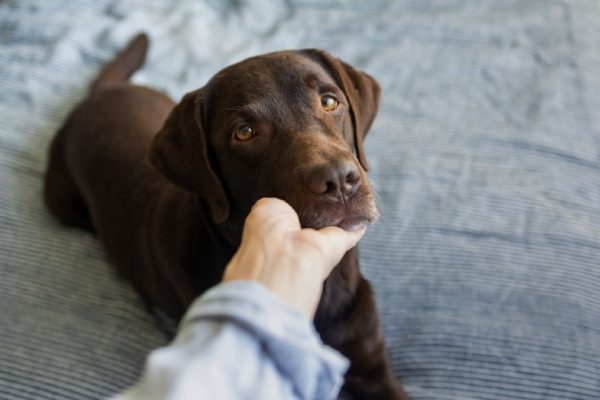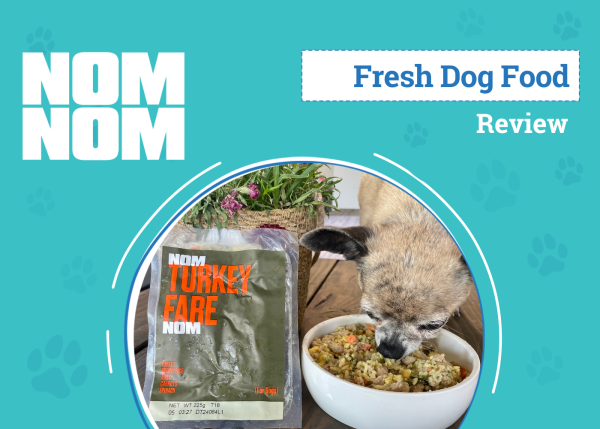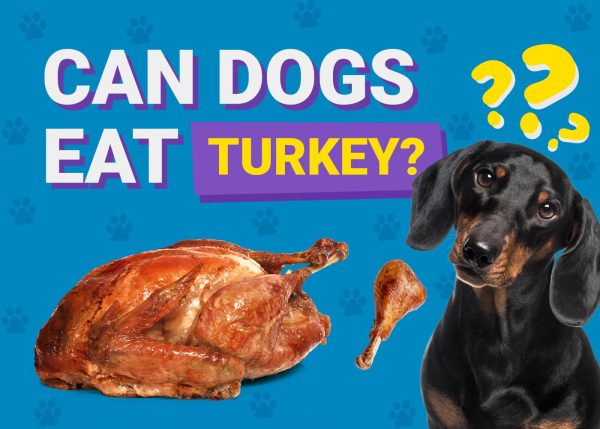It’s no secret that many of our canine companions are voracious eaters! They are always into something and can never be trusted around the family garbage can. But how hungry is too hungry?
If you’ve noticed some appetite changes lately or you’re not sure exactly what is normal, we’re going to discuss some potential reasons your dog might be feeling a little more hungry than usual. Often, the answer is simple.

The 12 Reasons Your Dog May Be Always Hungry
1. Competition for Resources
This obsessive eating behavior is something that they might have learned with their littermates. If you’ve brought home a new puppy or dog and they seem to be devouring their meal as they’ve never seen food before, it’s very likely because they are used to the survival of the fittest mentality, especially if you have more than one dog in the home.
When littermates eat together, or when dogs have had to live in close company with other dogs, it is often a rush to the finish line due to competition for resources. In this case, the resource is food, and your dog may know what it feels like to go without. Instead of missing another meal, they will fight to consume as much as possible.
If you have more than one dog, feeding the dogs in separate areas may help slow down their eating if they feel like they don’t have to compete. They will soon learn that there is plenty of food to go around.
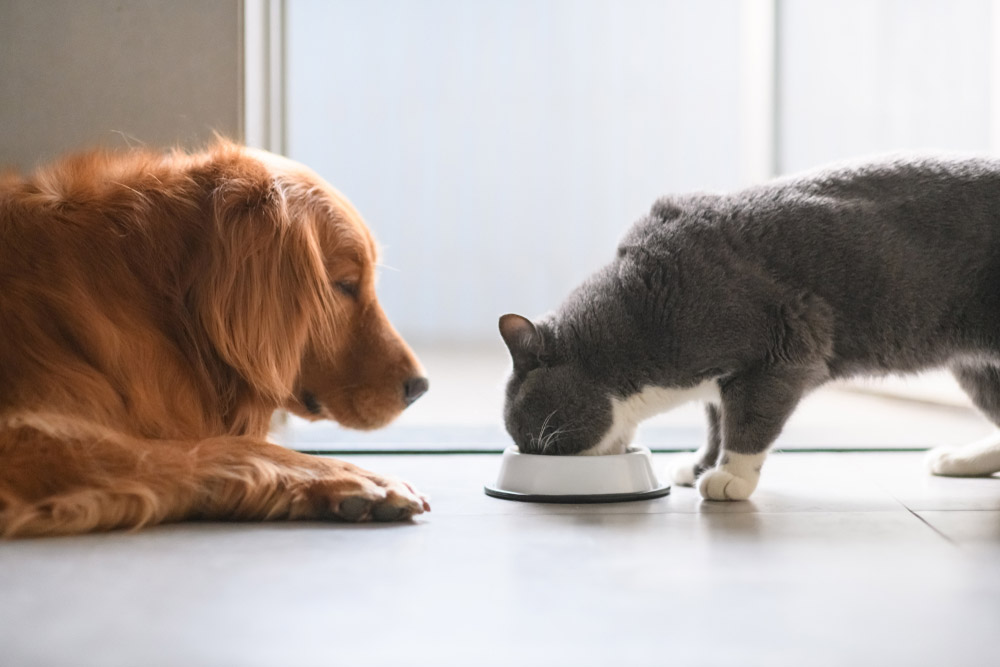
2. Genetics
Genetics can greatly influence how dogs behave, including their appetite. Certain breeds in particular are known to have voracious appetites.
- Labrador Retriever and Flat-Coat Retriever (due to a mutation in the pro-opiomelanocortin (POMC) gene)
- Beagle
- Bulldog
- Dachshund
- Basset Hound
- Pug
- Rottweiler
Because health issues like bloat can happen with voracious eaters, it is important to portion correctly. Sometimes, investing in slow feeders can also be beneficial.

Health Issues
Certain health issues can impact your dog’s hunger. While there can be an endless number of reasons a certain health condition might cause excessive hunger, here are the most common culprits. It’s important to see a vet if your dog’s increased appetite is sudden and you think it can be attributed to a health problem.
If you need to speak with a vet but can't get to one, head over to PangoVet. It's our online service where you can talk to a vet online and get the advice you need for your pet — all at an affordable price!

3. Diabetes mellitus
Diabetes mellitus often causes increased hunger, which is also known as polyphagia. When dogs aren’t able to produce enough insulin (the hormone that allows blood sugar to enter the body’s tissues), their body thinks it is starving and signals are given off that tell the dog to eat more. Your dog may even be losing weight despite eating more.
- Excessive thirst
- Increased urination
- Weight loss
A dog with diabetes will be closely monitored, and treatment may vary depending on the severity of the disease and how well-controlled it has become.
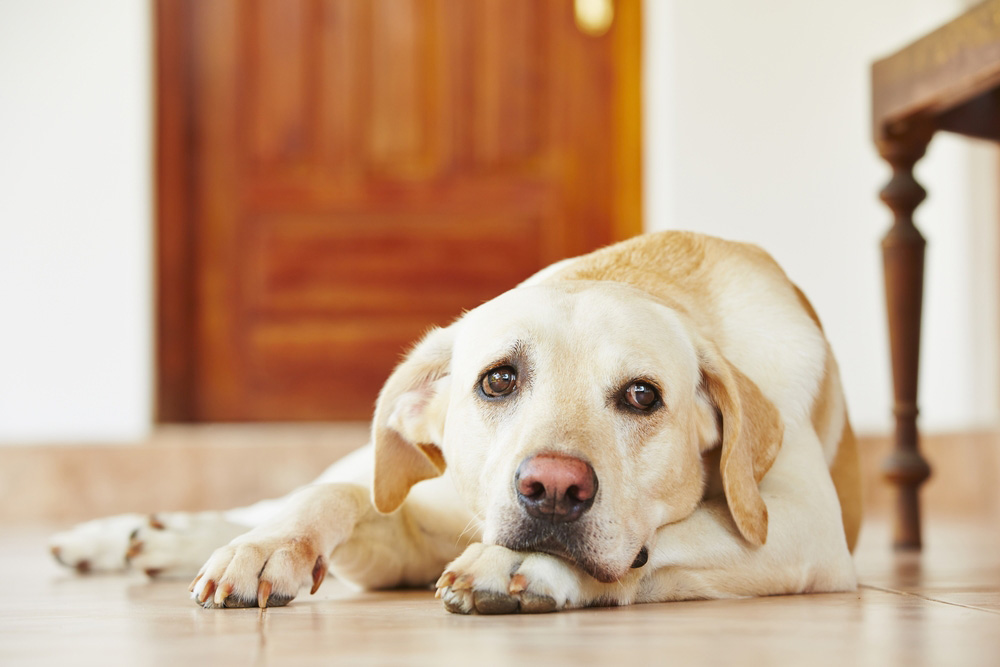
4. Exocrine Pancreatic Insufficiency (EPI)
If your dog suffers from exocrine pancreatic insufficiency, it means that their pancreas does not produce the correct digestive enzymes to break down the food. Because it interferes with digestion, dogs with EPI often suffer from malabsorption also. This can influence appetite because the body still feels it needs nutrition even when food has been eaten.
- Weight loss
- Loose, voluminous, greasy stools
- Increased appetite
EPI can be the result of autoimmune destruction of the enzyme making cells of the pancreas, or it can be the result of chronic pancreatitis or a tumor within or near to the pancreas.

5. Hyperadrenocorticism (Cushing’ Disease)
Cushing’s disease is caused by excess cortisol production due to a tumor in either the adrenal gland or the pituitary gland. Cortisol is known as the “stress hormone” and is released when the body is in “fight or flight” mode. It also regulates metabolism and immune function. When cortisol increases, so too does appetite, so dogs with Cushing’s Disease are polyphagic (eat excessively).
- Increased thirst
- Increased urination
- Increased panting
- Skin changes
- More frequent infections, including skin and urine infections
- Abdominal distention
6. Malabsorption
Malabsorption is usually a symptom of a disease process that causes a dog to feel hungry all of the time.
- Parasites
- Inflammatory bowel disease
- Intestinal neoplasia
- Small intestinal bacterial overgrowth
- Ulcerative colitis
Treatment will depend on the underlying issue. Your vet will run a series of tests to determine the problem.

7. Cancer
Cancer is a devastating disease that impacts so many dogs annually. Often, symptoms go unnoticed because they are so subtle in the beginning stages. Some dogs can be very asymptomatic until the disease is quite advanced.
Cancer symptoms can vary quite drastically depending on the area of the body it affects. Cancer can cause an increase in hunger because cancer cells require a lot of energy to divide rapidly.
If your dog shows any abnormal behaviors, including these changes with hunger or digestion, it is crucial to mention it to your vet. They might want you to come in for blood panels to see if they can find an underlying cause.
8. Parasites
Parasites are very common in dogs, which is why we’ve listed this as its own reason for increased appetite. Parasite prevention is put in place for a reason.
If your dog has parasites in their system, they can quickly multiply and start to negatively affect your dog’s systems, leading to excess hunger. Parasites will rob your dog of vital nutrients so you might notice also that your pup has a little weight loss with the increased hunger.
- Loose stools
- Vomiting
- Weight loss
- Distended abdomen
- Malnutrition
- Respiratory issues
- Visible worms in fecal matter
- Recurring infections
Luckily, most parasites are easy to treat with routine antiparasitic treatments. Your vet can prescribe the right one depending on what type of parasite your dog has.
9. Medications
Certain medications can impact your dog’s overall personality. One aspect that medications can affect is appetite. Many medications are known for suppressing the appetite, while others are known to enhance it.
There are medications that veterinarians may use to stimulate a dog’s appetite, for example if a dog is suffering from kidney disease and a lack of appetite as a result of it. Some medications are used to help more generalized conditions but a side effect may be an increased appetite.
- Mirtazapine
- Prednisone
- Capromorelin
- Maropitant (an anti-nausea medication which can help a dog to feel it wants to eat)
If your dog recently got on medication and you noticed the issue happened shortly after, you can speak with the vet about the effects of the medication and how long you can expect to see the reaction.

10. Stress or Anxiety
Have you ever been extremely stressed or anxious and so you “stress eat”? The same sensation can happen to our dogs. If they are very nervous, it can impact how hungry they feel. Anxiety and stress can be pretty difficult to treat because it involves finding out why your dog is stressed and often making lifestyle changes.
If your dog is stress eating, it is important to keep meals on a regular schedule and not feed extra. Free feeding is never an option when it comes to nervous eating. Your dog will eat you out of house and home, and it can contribute to obesity and a number of other issues.
It is important to work with a vet to come up with healthy ways for your dog to alleviate stress and anxiety without developing unwanted behaviors.
11. Lack of Proper Nutrients
If your dog is having any kind of issue with digestion or the food that they’re on doesn’t give them all the nutrients they require, they may overeat in an attempt to get the nutrients they need.
Lack of proper nutrients can lead to issues like pica.
- Dirt
- Clothing
- Rocks
- Ice
While pica itself isn’t necessarily life-threatening, it can cause a lot of very risky things, like choking and bowel obstructions.
12. Boredom
If your dog is really bored and doesn’t really have a lot to fill their day, it’s a very normal thing for them to overeat. After all, don’t we snack the most when we are bored? Always make sure that your dog is getting the appropriate amount of exercise in a day.
If you think they are not getting enough stimulation, you can work hard to provide extra entertainment around the house.


Ways to Help Hungry Dogs
When you have a hungry pup, what are some ways you can help make sure they are getting the proper amounts and not overeating? We have you covered.
Keep Up with Appropriate Vetting
If you keep up with vetting, it can tell you so much about your dog that you might not have known otherwise. Like many other animals in the animal kingdom, dogs are often very good at disguising their illnesses.
Sometimes we don’t understand there’s a problem until it’s pretty advanced. Often, pet parents that wait are faced with tough choices and expensive surgeries. It’s always best to understand when our dog’s behavior changes so we can respond appropriately.
Keep up with your dog’s anti-parasite medications so that they don’t suffer with pesky parasites stealing their nutrients.

Pinpoint the Issue
If there truly is a problem with your dog and their appetite, you should make it your mission to get to the bottom of it. Your vet can give your dog blood tests, and they should be able to rule in or out any health issues that might be bubbling under the surface.
This way, you can work out ways to encourage your dog to eat healthily without the extras.
Feed Smaller Meals More Frequently
If you only feed your dog once or twice a day, this can be really problematic for certain appetites. Instead, try to feed them smaller meal portions throughout the day. That way, they’re not going so long in between meals, and you aren’t overfeeding them.

Conclusion
Now you understand a few reasons why dogs might have a heightened appetite. Remember, if you have noticed any changes, definitely mention them to your vet if you haven’t done so already.
Featured Image Credit: Masarik, Shutterstock










